Aimless Love
05/08/14 18:58
Billy Collins: Aimless Love: New and Selected Poems (New York: Random House, 2013)
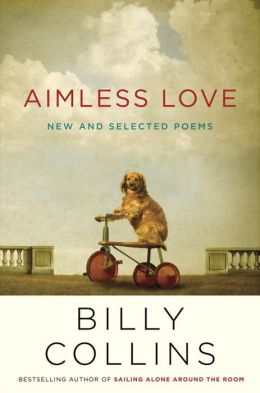
Billy Collins has a unique kind of genius with words that allows him to explore a wide variety of meanings while at the same time maintaining a sense of playfulness. Everyday life is his source of inspiration. Some poets write about the extremes of love and life and loss, and their poems are rich and meaningful. Collins writs about everyday objects, situations and the kind of people I know. His poems become one of the refrains of my struggle to make meaning out of this one life on earth.
This is a book to which I will return again and again. It is a book that will be a source for perspective for many years to come.
No Man's River
05/08/14 18:31
Farley Mowat: No Man’s River (New York: Carroll & Graf, 2004)
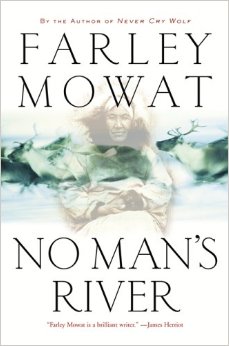
I found myself to be caught up in the story even though I knew parts of it from my recent reading of other Mowat books. His characters, including himself, are strong people in the face of a brutal environment. His ability to speak of indigenous, Metis and newcomers as people who can communicate and develop genuine concern for one another is an important message in 21st Century Canada where the struggles for reconciliation will yet take hundreds of years of careful storytelling and listening.
I’m glad I discovered Mowat this year and that I had the opportunity to read his books in a short period of time. He is a writer whose works will continue to be important in the story of Canada and in the struggles of her people for generations to come.
How (Not) to Speak of God
05/08/14 08:15
Peter Rollins: How (Not) to Speak of God, (Brewster, Ma: Paraclete Press, 2006)
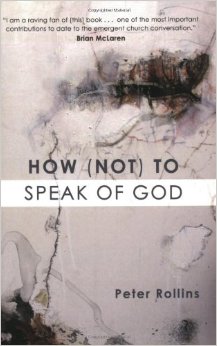
What is missing from this book, not that Rollins intended it to be included) is the sense of the way forward and a sense of the nature of the emergent church. There are several services included in the volume that seem to be descriptive of a particular style of worship - al are heavily scripted and well thought out. There is, however, no real discussion of how such services can be presented in some kind of sustainable format. The meeting in the pub congregation doesn’t seem to have enough organization to provide for the quality of leadership that is required for such events to continue.
Deconstructionists, however, are not concerned with sustainability. They really aren’t concerned with offering alternatives, but rather in identifying the problems with the current powers that be. At that Rollins is willed and effective.
The book is a good read for those familiar with postmodernism and probably should be required reading for some of our colleagues who are caught up in more fundamentalist theologies.
Preaching after God
04/08/14 20:21
Phil Snider: Preaching After God (Eugene, Or: Cascade Books, 2012)
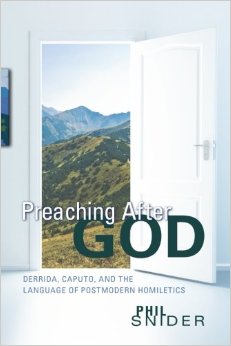
When I first encountered deconstructionist theology in the emergent church with authors like Peter Rollins, my initial reaction was that they were simply discovering postmodern theology some thirty to forty years after I explored that genre. Many contemporary postmodern theologians, like Rollins, come from more fundamentalist backgrounds and often from traditions that are not known for being on the cutting edge of academic theology.
Phil Snider, however, comes from a tradition closer to my experience. He is a Christian Church (Disciples of Christ) pastor who serves a church a bit closer to the liberal end of the theological spectrum. His book provided an opportunity to take a fresh look at postmodern theology and try on some of the ideas of the deconstructionists.
For the most part Snider doesn’t have a whole lot of new theology in his book. He spends most of his time exploring theologians who emerged just after the Second World War. Still it is an intriguing book and gives a perspective and some language tools to talk with all of the millennials who are just now discovering the theological concepts that I thought were brand new when I was their age.
The book is a good read for those who love theology and a good discussion starter for clergy and lay persons alike.
The Desperate People
04/08/14 19:32
Farley Mowat: The Desperate People (New York: Little Brown, 1959)
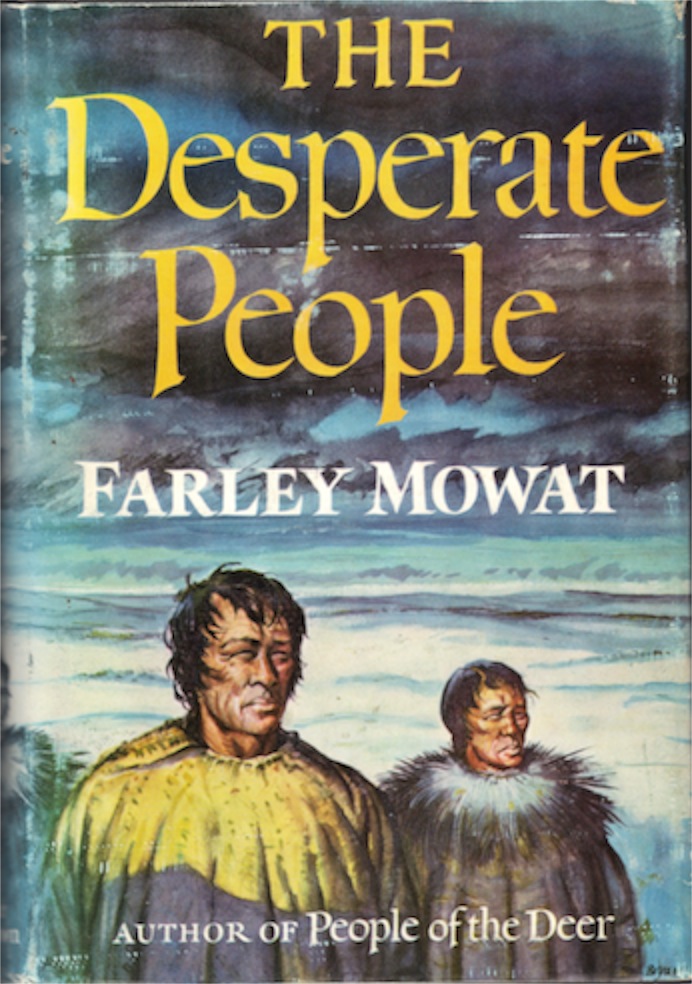
The story of these people simply does not have a happy ending. The book is not a happy book.
It is, however, an important book because it tells a story that might not have otherwise been told. As we seek reconciliation in our relationships with indigenous people, it is critical that we open ourselves to hearing more than just part of the story. The story of people on this continent is an ancient story with many different twists and turns. To think that our generation is the only one to have witnessed the power and beauty of the land is to embrace a falsehood.
Im grateful to Mowat for this book despite the fact that it was a very difficult book to read - a story I wish was not as true as it is.
Never Cry Wolf
04/08/14 19:07
Farley Mowat: Never Cry Wolf (New York: Little Brown, 1963)
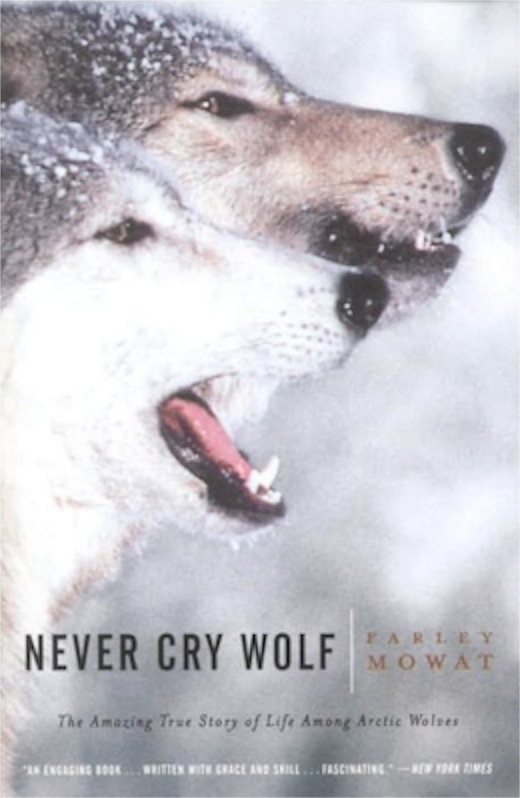
So I am not prone to be as romantic about wolves as is Mowat. Nonetheless, there is a significant degree of truth in his writing. I don’t know what has engendered such fear of wolves and such irrational animosity toward them. Wolves pose very little danger to humans. Unlike other apex predators such as the grizzly or the mountain lion, there are no reports of wolves killing humans except in fiction. I’m not saying it never has happened, just that it isn’t something that one needs to fear.
Underlying the discussion is the simple fact that Mowat is a master story teller and his book presents the story of wolves in the way that an academic study might never have done. Yes, he does bend the facts a little bit. The criticism of the book is, for the most part valid. But sometimes the best way to tell the truth is to tell a story and Mowat has certainly told a compelling story with this book. For lovers of the north country and lovers of the animals and people who live there, this book provides a window on a place that few will ever visit.
People of the Deer
04/08/14 18:42
Farley Mowat: People of the Deer (New York: Carroll & Graf, 2005)
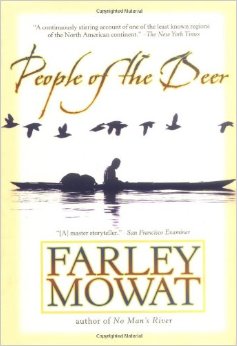
Mowat stirred some controversy during his life, more from his writings about wolves than his writings about people, but he did sound a cry for a change in our attitudes and behavior toward indigenous people. It took a long time for people to respond to the voices like Mowats, but slowly things are changing in the north country. In some cases it is too little too late,
People of the Deer is a good starting place to read Mowat. His careful description of the geography and its people is inviting and eye-opening. The result is a delightful and challenging book.
Stay
04/08/14 16:43
Jennifer Michael Hecht: Stay: A History of Suicide and the Philosophies Against It (New Haven: Yale University Press, 2013)
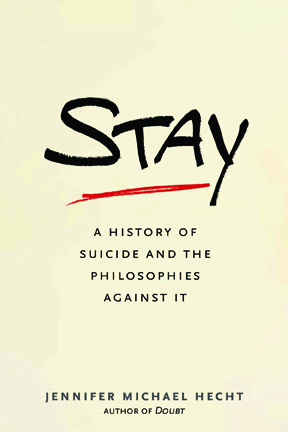
But I do have to admit that this book is a little dry in some places. Still, the book is well worth reading and the information very useful. The preface tells the highly personal story of how the author got into the study of suicide and the ways in which various cultures have dealt with self-caused death. Her essay with the same title as the book has received a lot of attention in suicide prevention circles and is very touching and worth quoting.
I am grateful for the work that has gone into this volume. I wouldn’t label it an easy read, either intellectually or emotionally, but it is a critical subject and one worthy of such a complete review by such an exemplary scholar. Every college library should have a copy and the book would be a good textbook both for philosophy classes and for psychology classes examining the subject of suicide.
Canoe Paddles
04/08/14 14:38
Graham Warren and David Gidmark: Canoe Paddles: A Complete Guide to Making Your Own (Kingston, Ontario: Firefly Books, 2001) I have a copy of the fifth printing in 2012.
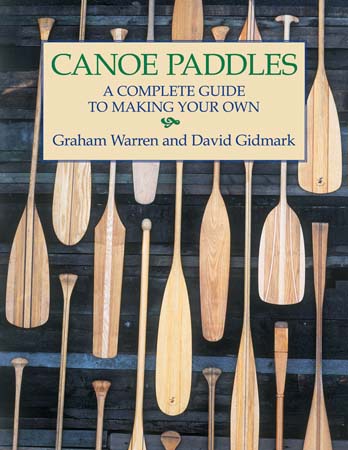
Friends in the canoe world all agree that Warren and Gidmark’s book is the best guide to making your own paddles. I had instructions for making paddles from several other canoe-building books, but this really is “complete” just as the subtitle claims. It is good to learn a bit about the history and and differences between various paddles and to learn how to make paddles that are not only functional, but also beautiful.
I still can’t carve a paddle that is as good as some of the ones that the custom paddle makers produce, but I and learning and there is great satisfaction in paddling a canoe you made with a paddle you carved.
Pastrix
04/08/14 14:03
Nadia Bolz-Weber: Pastrix: The Cranky, Beautiful, Faith of a Sinner & Saint (New York: Jericho Books, 2013)
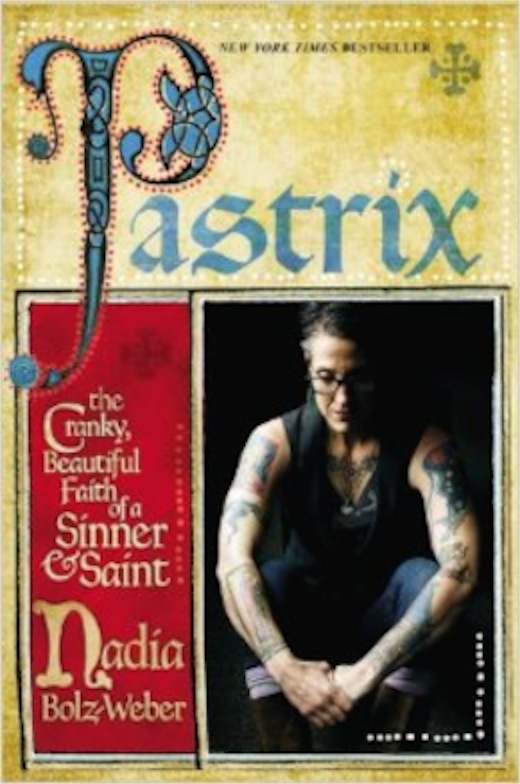
What struck me most about the book and about Bolz-Weber is how conventional she is. Her ideas are not somehow new and radical and different from the ideals with which we began our ministry. Her church is not somehow liturgically distant from the rest of Christianity. It seems to me that what she and her community are doing is trying to live the faith as genuinely and as sincerely as they are able - and doing so with humor and a dash of creativity.
No, I don’t think our church is likely to put a chocolate fountain in the baptismal font for the Great Vigil of Easter. But I do find it hopeful that the House for all Saints and Sinners is observing the Great Vigil of Easter. What Bolz-Weber is offering, it seems to me is Christianity that is in many ways more steeped in the traditions of the church and its biblical and historical roots than many big-box mega churches and mega-church wannabe congregations. When she speaks of the Christian faith, what she describes is the journey that the church has been on for a couple of thousand years.
The book is a good read. Her congregation would be well worth a visit. And I hope that she gets some recognition outside of mainstream Christianity. For me it is hopeful to recognize that the emergent church is more of a reaction to the negativity of fundamentalism than it is a reaction to mainline Christianity.
Sailing Alone Around the Room
04/08/14 11:13
Billy Collins: Sailing Alone Around the Room: New and Selected Poems (New York: Random House, 2000)
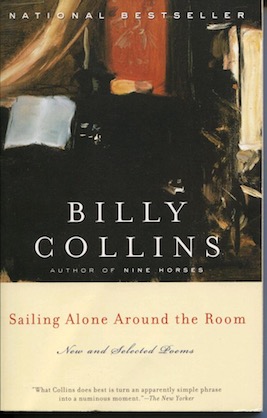
This collection of poems did not disappoint me. Although I had set the discipline of reading one poem a day to allow the poems to sit with me and me to reflect on them, there were days when one Billy Collins poem just wasn’t enough. I found myself reading the poems out loud when I was all alone and laughing out loud as well.
Although the words Collins uses are simple and common, there are no simple phrases anywhere in the book. Each combination of words serves as an invitation to go deeper into our emotions and our observations. Collins can take some simple experience and turn it into a slice of life that makes you want to remember.
My choice of poet for 2014 has been just right for my year.
Pride and Prejudice
04/08/14 10:31
Jane Austin: Pride and Prejudice
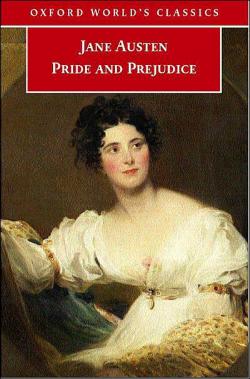
There is no mystery about why this novel has become known as one of the pieces of literature that defines the form. It is well-written and carefully crafted. The characters are fully developed and we get a sense of their inner lives and motivations as well as the narrative of the story. The problem is that the story itself is well, rather boring. There really isn’t much of a story her at all.
The thing that I didn’t expect was the amount of humor in the book. There are some real “zingers” in the book - conversation that would have been pointed in which to participate and very funny to witness. Her characters possess great wit and the ability to deliver that wit to the source of the humor.
All in all, it is a book worth reading.
It is not, however, a story that I’ll ever re-tell. It just isn’t quite that interesting.
Rilke's Book of Hours
04/08/14 08:35
Anita Barrows and Joanna Macy, translators and editors: Rilke’s Book of Hours: Love Poems to God (New York: Riverhead Books, 2005)
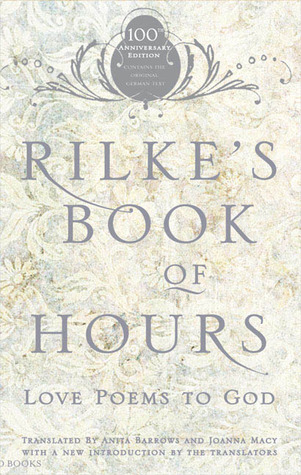
Even though I don’t read German, I find the layout of this book to be just right, with the German text on the left and the translation on the right. I always think of German as an expansive language with very long words and lots of run-on sentences, but in virtually every poem, it takes more words to express the meaning in English than in German. I have developed a deep respect for Barrows and Macy in their work as translators. On several occasions I have used the poems as devotions having a colleague read the German so that we can hear the rhythm of the original and compare it with the rhythm. In some cases, you get the sense that Barrows and Macy have almost produced entirely new poems. Except the seeds of the ideas are contained in Rilke’s originals every time.
This is a book that many will want to own. It is one to which I will return again and again.